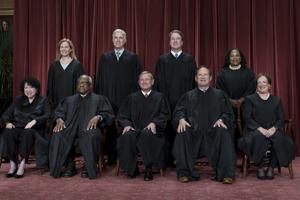News
Column: Trump failed the first test of the American experiment
Donald Trump violated a principle central to the American experiment and the Supreme Court should do as the Constitution directs, former Pentagon reporter James Rosen writes in an opinion column.
By: dailypress
- Jan 12 2024
- 0
- 0 Views
In March 1801, Thomas Jefferson prepared to succeed John Adams as president of the United States. Four years earlier, George Washington had left office voluntarily, rejecting widespread appeals for him to serve a third term, so the Adams-Jefferson transfer of power was the first test of a core principle of the young nation: An incumbent president would give way to his successor peacefully, no matter how bitter their political differences. The election was close. It ended up in the House of Representatives, which chose Jefferson in an extraordinary affront to the older Adams. The competing monarchs of Europe had fought wars over succession to the throne. They’d scoffed at the newfangled notion that democratic elections, not bloodlines, could choose the leaders of a country. The caustic Adams-Jefferson campaign appeared to justify their skepticism. And yet: On March 4, 1801, when the voices had quieted and the invective had ebbed, Adams calmly yielded power to Jefferson and urged his supporters to follow his lead. The Adams-Jefferson example, with Al Gore’s graceful acquiescence to George W. Bush two centuries later, provide the strongest historical proof that Donald Trump’s actions and words, after the 2020 election and continuing today, violate the most profound American traditions of self-rule. Far worse, they form a direct assault on our constitutional democracy. In recognition of this threat, the Colorado Supreme Court last month banned Trump from the state’s primary ballot, followed by a similar prohibition from Maine’s top elections official. The U.S. Supreme Court has agreed to hear Trump’s appeal of the Colorado ban. On Jan. 6, former 4th Circuit Appeals Judge J. Michael Luttig, who served on the most conservative federal appellate court for 15 years after his appointment by Republican President George H.W. Bush, told MSNBC: “The framers of the 14th Amendment (to the Constitution) envisioned precisely this moment when they wrote the disqualification clause of the 14th Amendment — the moment when, despite losing a presidential election, a president of the United States would attempt to remain in the presidency beyond his four-year term and prevent the peaceful transfer of power to his successor who had been elected by the American people.” Just over 23 years ago, I reported from Florida in a postelection marathon to decide whether George W. Bush or Al Gore would be president. For 40 days, election officials followed Florida’s law, which required a recount if the margin was less than one-half of 1%. Bush’s lead of 537 votes was one-twentieth of 1%. But the Gore campaign initially requested recounts only in the heavily Democratic counties of South Florida, prompting claims of cherry-picking the votes. The Florida Supreme Court belatedly ordered a statewide recount of all “undervotes” — 61,000 ballots that vote-tabulation machines had failed to record. One day later, however, the U.S. Supreme Court halted all counting in a 5-4 ruling that handed Bush the election. The majority opinion, signed by five justices appointed by Republican presidents, said Florida’s helter-skelter method of running elections in 67 counties violated the Constitution’s “equal-protection clause” because it didn’t have a uniform statewide standard for counting votes. Ironically, that clause is in the same 14th Amendment that the Colorado Supreme Court relied on last month to ban Trump from its ballot. Now, as I believed then, the U.S. Supreme Court had overreached in citing the equal-protection clause: Counties across the country count votes differently, and few states have uniform tally methods. My view has not changed that in handing Florida and thus the presidency to Bush in a divided, party-line decision, the Supreme Court issued a partisan ruling at odds with the constitutional mandate giving states the authority to run federal elections. The high court is again being asked to infringe on states’ election prerogatives. Reporting in Florida almost a quarter-century ago, I never imagined that the Supreme Court would face a more important decision in a presidential election, but the nearly unfathomable reality of Donald Trump has outstripped my imagination.
























